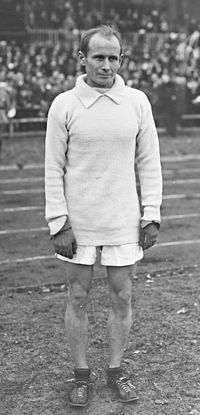
Athletics is a group of sporting events that involves competitive running, jumping, throwing, and walking. The most common types of athletics competitions are track and field, road running, cross-country running, and racewalking.
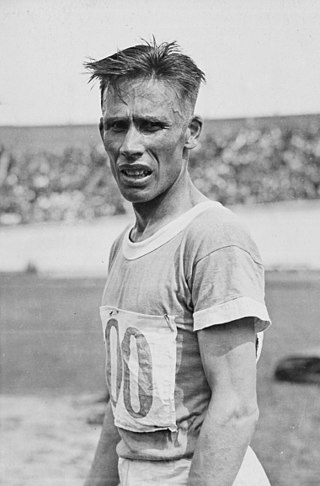
Vilho "Ville" Eino Ritola was a Finnish long-distance runner. Known as one of the "Flying Finns", he won five Olympic gold medals and three Olympic silver medals in the 1920s. He holds the record of winning most athletics medals at a single Games – four golds and two silvers in Paris 1924 - and ranks second in terms of most athletics gold medals at a single Games.

Juho Pietari "Hannes" Kolehmainen was a Finnish four-time Olympic Gold medalist and a world record holder in middle- and long-distance running. He was the first in a generation of great Finnish long-distance runners, often named the "Flying Finns". Kolehmainen competed for a number of years in the United States, wearing the Winged Fist of the Irish American Athletic Club. He also enlisted in the 14th Regiment of the National Guard of New York, and became a U.S. citizen in 1921.

Lasse Artturi Virén is a Finnish former long-distance runner, winner of four gold medals at the 1972 and 1976 Summer Olympics. Virén recaptured the image of the "Flying Finns" promoted by runners like Hannes Kolehmainen, Paavo Nurmi and Ville Ritola in the 1920s. He was elected Finnish Sportsman of the Year in 1972 and 1976 and later became a politician and a member of Finland's parliament in 1999–2007 and 2010–2011.

The men's marathon was a track & field athletics event at the 1900 Summer Olympics in Paris. It was held on July 19, 1900. 13 athletes from five nations competed in the marathon, which used a distance of 40.26 kilometres.
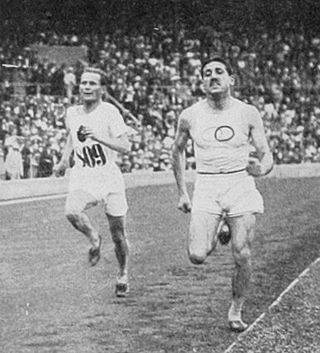
The men's 5000 metres was a track and field athletics event held as part of the Athletics at the 1912 Summer Olympics programme. It was the debut of the event, which along with the 10000 metre event replaced the 5 mile race held at the 1908 Summer Olympics. The competition was held on Tuesday, July 9, 1912, and on Wednesday, July 10, 1912. Thirty-one long-distance runners from eleven nations competed. NOCs could enter up to 12 athletes.

Finland competed at the 1920 Summer Olympics in Antwerp, Belgium for the first time as a fully independent state. It did compete at the previous Olympics, however, only as the Russian-dependent Grand Duchy of Finland. 63 competitors, 62 men and 1 woman, took part in 51 events in 9 sports.

The men's marathon was a track and field athletics event held as part of the athletics at the 1912 Summer Olympics programme. The distance used was 40.2 kilometres, nearly 2 full kilometres shorter than that used in 1908 and since 1924. The competition was held on Sunday, July 14, 1912. 95 runners entered, but only 68 runners competed. NOCs could enter up to 12 athletes. With conditions described as "very hot", only 36 of the 68 competitors finished. The event was won by Ken McArthur of South Africa, the nation's first Olympic marathon victory.

The men's marathon event was part of the track and field athletics programme at the 1924 Summer Olympics. The marathon was held on Sunday, July 13, 1924. It was only the second Olympic marathon to use the distance of 42.195 km which was first used in 1908 and is now the standard marathon distance. Fifty-eight runners from 20 nations competed, with no more than 6 runners per nation. The event was won by Albin Stenroos of Finland, the nation's second consecutive Olympic marathon victory.

The men's marathon event at the 1936 Summer Olympic Games took place August 9. Fifty-six athletes from 27 nations competed. The maximum number of athletes per nation had been set at 3 since the 1930 Olympic Congress. The race was won by Sohn Kee-chung, a Korean athlete competing for Japan; Sohn refused to acknowledge the Japanese anthem at the victory ceremony. Sohn was the first Korean athlete to win an Olympic gold medal, though the medal remains credited as Japan's first victory in the Olympic marathon. Finland (barely) missed the marathon podium for the first time since World War I, with its top two runners placing 4th and 5th.

The men's marathon at the 1932 Summer Olympics took place on August 7. It started and finished at the Los Angeles Memorial Coliseum. Twenty-eight athletes from 14 nations competed. The 1930 Olympic Congress in Berlin had reduced the limit from 6 athletes per NOC to 3 athletes. The event was won by Juan Carlos Zabala of Argentina, the nation's first Olympic marathon medal. Great Britain also earned its first Olympic marathon medal with Sam Ferris's silver, while Finland made the marathon podium for a fourth consecutive Games as Armas Toivonen won bronze.

Ethiopia competed at the 2012 Summer Olympics in London, from 27 July to 12 August 2012. This was the nation's twelfth appearance at the Olympics, having missed three occasions because of the African, Soviet, and North Korean boycott. The Ethiopian Olympic Committee sent a total of 35 athletes to the Games, 18 men and 17 women, to compete only in athletics, specifically in the middle and long-distance running events, and swimming, the nation's Olympic debut.
Arthur Vincent Roth was an American long-distance runner who won the 1916 Boston Marathon and competed in the men's marathon at the 1920 Summer Olympics.
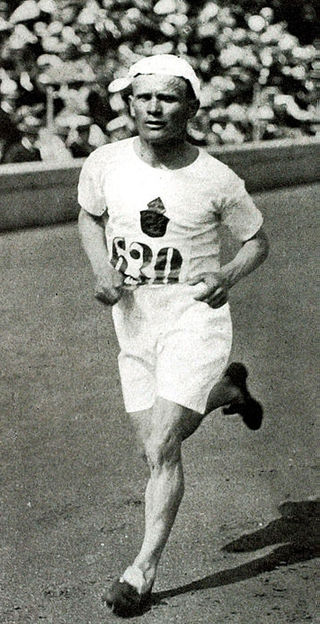
Tatu Kolehmainen was a Finnish long-distance runner who competed at the 1912 and 1920 Summer Olympics. In 1912 he reached the finals of 10,000 m and marathon races, but failed to finish due to a strong heat. In 1920 he placed 10th in the marathon. His younger brother Hannes competed alongside at the 1912 and 1920 Games.

The 5000 metres at the Summer Olympics has been contested since the fifth edition of the multi-sport event. The men's 5000 m has been present on the Olympic athletics programme since 1912. The 3000 metres was the first women's Olympic long-distance track event, making its initial appearance at the 1984 Olympics, and this distance was extended to match the men's event from 1996 onwards. It is the most prestigious 5000 m race at elite level. The competition format typically has two qualifying heats leading to a final between fifteen athletes.
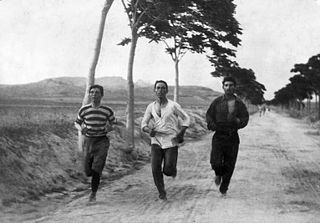
The marathon at the Summer Olympics is the only road running event held at the multi-sport event. The men's marathon has been present on the Olympic athletics programme since 1896. Nearly ninety years later, the women's event was added to the programme at the 1984 Olympics in Los Angeles.
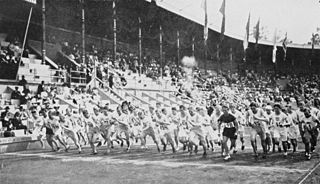
Cross country running at the Summer Olympics was held at the multi-sport event for men only from 1912 to 1924. During its brief tenure as an Olympic event, it featured on the Olympic athletics programme. Medals were awarded on an individual race basis as well as a national team points basis.
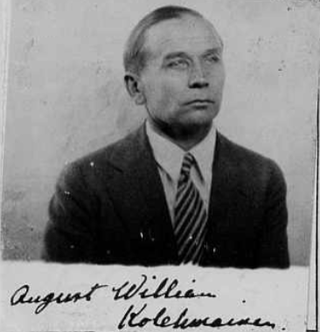
August William Kolehmainen, known in Finland as Viljami Kolehmainen, was a Finnish-American long-distance runner and track and field coach. The brother of fellow runners Hannes and Tatu, William Kolehmainen moved to the United States in 1910 and became a professional runner there, setting a long-standing marathon world best in 1912.

Eritrea competed at the 2016 Summer Olympics in Rio de Janeiro, Brazil, from 5 to 21 August 2016. It was the nation's fifth consecutive appearance at the Summer Olympics.

The men's marathon event at the 2020 Summer Olympics started at 07:00 on 8 August 2021 in Sapporo, Japan. 106 athletes from 46 nations competed. The previous Olympic champion, Kenyan Eliud Kipchoge, successfully defended his title, with Dutch and Belgian athletes Abdi Nageeye and Bashir Abdi gaining silver and bronze, respectively. Kipchoge was the third man to repeat as Olympic marathon champion, after Abebe Bikila and Waldemar Cierpinski. The Netherlands and Belgium earned their first men's marathon medals since 1980 and 1976, respectively.
